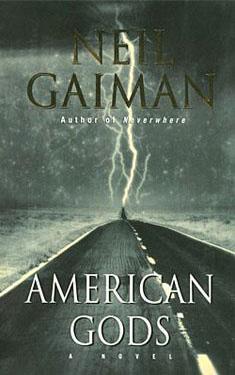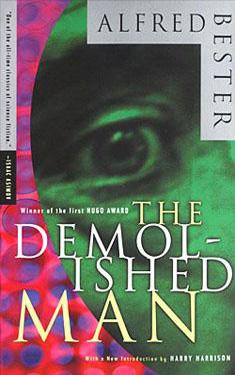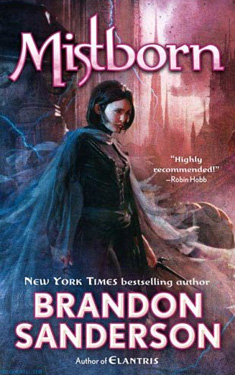Recently Read Books in Brief
 American Gods, by Neil Gaiman
American Gods, by Neil Gaiman
This is probably Gaiman’s most popular novel, and the 155 reads recorded from our members’ stats attests to that. I wish I could share their enthusiasm. While American Gods is certainly both competent and entertaining, I have enough problems with it that I simply don’t much care for it as a story. Gaiman’s prose style isn’t bad, though it is never great, and I would have liked something a little better for a story dealing with such high-minded ideas. But it is the ideas that are the problem, here. Gaiman has written about the survival of ancient, unworshipped gods before and since, especially in his Sandman series and in the later Anansi Boys. The big idea that he repeats in all these works is that gods are beings born out of the collective religious consciousness of a people, that they are phantasms which can exist only so long as they are worshipped, but who still possess what we would think of as godlike powers while they still live. This is hardly a dull idea, even if it is reheated Jungianism, and it’s not hard to see why it found such a large audience. Unfortunately, I simply cannot take Gaiman’s metaphysics seriously enough to enjoy the novel.
Even so, Gaiman imbues his story with some fine, human moments, and he even occasionally recalls his earlier skills as a horror writer. There’s a large section of the novel that takes place in an out-of-the-way town and which seems largely inconsequential to the story as a whole, despite a late attempt to tie it back into the main plot. The most entertaining part of the novel is that it makes you want to rummage through your Encyclopedia of Mythology to identify all the gods and demigods who appear (or you can use this cheatsheet, but where’s the fun in that?).
Not a bad read, but hard to take seriously, despite all its sound and fury. Might be worth reading as preparation for the upcoming HBO television adaptation.
 The Demolished Man, by Alfred Bester
The Demolished Man, by Alfred Bester
Ben Reich is a man troubled by dreams, living in a world of telepaths. Much as in Minority Report, crime is difficult to commit and easy to punish, and murder is all but impossible. The future sees humanity expanding to other planets, but still crippled by its faults and flaws. Bester does a magnificent job creating the world of 2301, and his prowess as world-builder is even better here than in his celebrated The Stars My Destination. Unfortunately, his skills as a crime-drama writer are not as good.
It’s not much of a spoiler say that Reich commits murder, because he does so very early in the novel. While there is some suspense in the first part of the book, that largely disappears once the murder is done. There is a long cat-and-mouse chase between Reich and the police, but frankly the reader spends most of his time waiting for the police to laboriously put together all the pieces he already knows, and then has to wait even longer to see if the unlikeable Reich ever gets caught and punished for his crime. The only suspense in the book concerns the identity of The Man With No Face, a dream image that haunts Reich’s dreams, but it’s not a very interesting mystery.
The Demolished Man is worth reading if only for some very intriguing prose interpretations of what a telepath conversation might be like, but not for the murder mystery which is at its core.
 Mistborn, by Brandon Sanderson
Mistborn, by Brandon Sanderson
I became familiar with Sanderson after he was chosen to finish Robert Jordan’s Wheel of Time series, so I decided to give his most popular trilogy a try. Mistborn is set in something like a post-apocalyptic Middle Earth—it’s a fantasy world where the evil god/wizard/warrior has won the battle against the chosen hero and remade the world in his own image. This is a magnificent idea, and Sanderson has a lot of fun with it in the first book of the trilogy. The resistance fighters are something like real-world revolutionaries, and are very much the underdogs. The group of heroes in here isn’t even the first to have attempted a revolution. This isn’t the kind of setup that would work apart from the larger body of genre fiction to play off of, but I expect it will be especially appreciated by those who have read fantasy for years.
Still, this isn’t a great series. Sanderson is a good writer, but I think he has a weakness when it comes to plotting. The first novel works as a whole, but the latter two are comparatively formless and sprawling. The trilogy ends in a very strange way, with an unfortunately literal deus ex machina. However, the alchemically-based system of magic is actually very detailed and precise in its functioning, something rare in fantasy literature, and much appreciated.
The first novel is decent, but it will make you want to read the follow-ups that fail to live up to the original.



















 Full Details
Full Details


3 Comments
Thanks for the update! I’ve read American Gods and The Demolished Man, and while I concur with your assessment on both I did enjoy the latter despite its flaws. The whole telepath bureau seemed a bit too goody-two-shoes to be true, and 90s SF show Babylon 5 took an interesting route making their Psi-Corps, modeled on Bester’s, as scheming, vindictive, and corrupt, naming its chief investigator Bester in a nod to the author. I very much like your description of American Gods as having some "fine human moments," which it certainly does, although I also had difficulties caring about the story. The ides are cool, but between the protagonist being led by the nose for most of the book and the fact that you don’t really know what is going on or what exactly is at stake for most of the novel makes it difficult to get invested in the action, but his use of mythology is very neat.
"The Demolished Man" is an all-time favourite, along with "Stars." I’ve enjoyed both tremendously, with "Stars" being the more rounded and tighter of the two. I believe everyone should read them both. "Demolished Man" is certainly a rolicking blast full of satire, lyricism, stylistic playfulness and pure science fiction invention. Bester is simply genius! "Mistborn" and "American Gods" are on my reading list and I’ve been putting off reading the later for quite a while now. @Mattastrophic, mentioning mythology caught my attention – I guess I will get to it sooner than later, now. And @Jonathan, I see no problem with "reheating Jungianism *smiley* Afterall, the main protagonist is named "Shadow" *another gratified smiley*. Personally, when refering to the relationships between myth, reality and history in literature (and I also think, in SF/F specifically) we should not ignore the refreshing work and interpretations of Mircea Eliade. I anticipated Shadow being a character disconnected from anima? Yes, I think I’ll read "American Gods" next! At the moment I’m reading "The Eye of the World" (my first ever attempt at The Wheel of Time), and so far I’m enjoying it. Sanderson is finishing the series because, as I understand it, the late Jordan’s wife enjoyed the Mistborn series. Your notes are a little discouraging, so I’ll guess reading "Mistborn" will be put on the back burner for a while longer. I think Brett Weeks "Night Angel Trilogy" will take precedent. Thanks for the effort!
Thank you very much for the reviews, they are absolutely appreciated. I agree with you about American Gods, in fact I go further and absolutely hate that book. I gave it a 1 out of 10 on this site’s rating system. Slow? Terribly. Boring? Check. Gratuitous sex that has nothing to do with the plot? Check. I never walk out of a theater before the movie/play/opera/ballet/whatever is over. Similarly, I always finish reading the book even if I don’t enjoy it. With American Gods I started skipping ten pages at a time to get to the end of the book just to say "I read it". Yeach.
Sorry, the comment form is closed at this time.